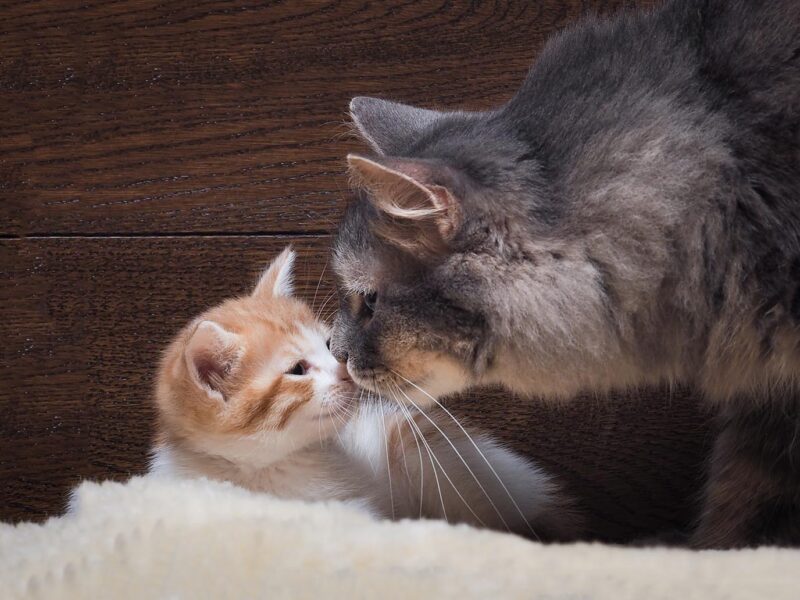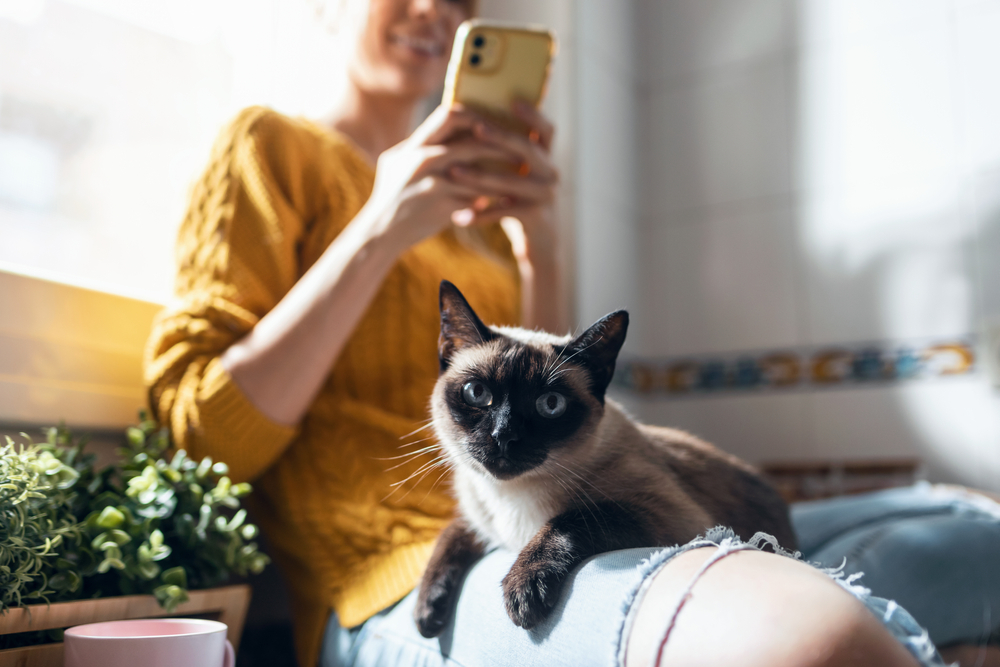Kittens change so much in their first year. They double their weight and go through several behavioral milestones, but do their personalities change too? Is there any way to accurately predict a kitten’s personality before they become an adult? You may have heard that kittens take after their mother, but how often is this true?
We discuss the answers to all these questions here, so you can raise your kitten into a friendly, gentle adult.
Does a Kitten’s Personality Change?
Yes, a kitten’s personality absolutely changes as they get older. However, it’s not a sudden switch flip. It slowly develops over time. They also may or may not have the same traits as their mother. In fact, you may be surprised to learn that you have a huge effect on your kitten’s personality as it changes, so you must wield this power carefully.
Here’s how you can expect your kitten’s personality to develop as they get older.
0–7 Weeks
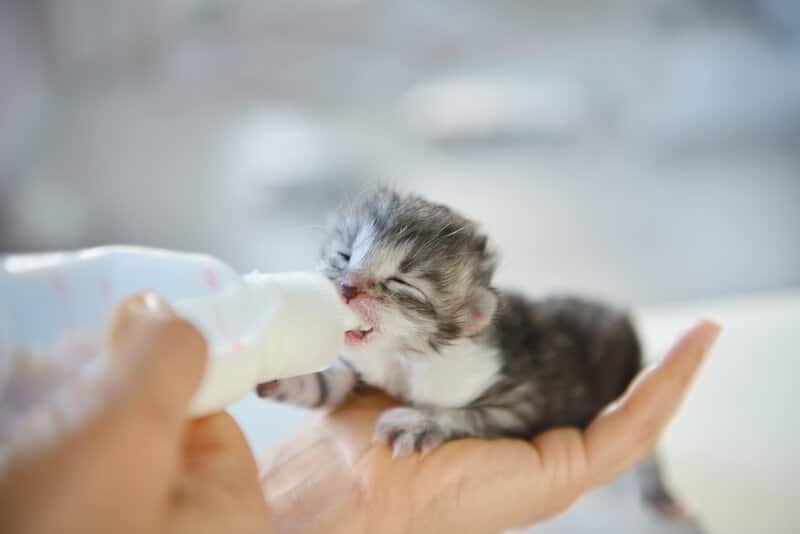
At this young age, kittens haven’t come into their personality yet. It will slowly become more apparent as they explore the world and become more confident. Their early experiences can have a huge effect on their personality, though. If they experience many negative and scary things at this age, they will grow up believing that the world is a frightening place. Their littermates and mother provide socialization and help them practice their new social skills.
Most kittens at this age are extremely energetic and curious. These traits don’t necessarily mean that they will stay this way as they grow. Instead, these are more like “default” traits that the vast majority of kittens will have.
7–12 Weeks
Around this age, kittens will begin exploring more on their own, and many will be separated from their mother and littermates to be given to new families. It’s vital that they are socialized well during this period, which means providing plenty of gentle handling and interactions with people.
Regular handling helps your kitten understand how to act with humans. Basic training is recommended, such as teaching kittens not to bite hands. Many kittens are still exceptionally active at this time. However, they will slowly become more trusting and friendly as they age with the proper socialization.
Your goal should be to help your cat remain confident and open to new things. You don’t want your cat growing up to be scared of everything.
3–12 Months
Most kittens are done growing by around 12 months. Before this point, they are exceptionally energetic. Plan on spending a great deal of time playing with them. Cats at this age tend to like running around the house more than anything. Some will wind down enough to cuddle, but don’t expect much!
Their hormones will start to surge as they reach sexual maturity at around 6 months. These may make your cat suddenly more independent or cuddlier. They may go from one extreme to the other. Your cat’s personality is likely more apparent at this stage. However, it is often more intense than it will be as an adult.
If your cat is fixed, they’ll also likely start calming down around 12 months, if not sooner. Cats that aren’t fixed may continue to be a bit hormonal into their second year of life. Bigger cats tend to hit maturity later than smaller cats, and they may remain hormonal until around 3 years of age.
While the time that your cat is going through puberty varies, the point is that it ends soon! In many cases, cats are not the best behaved during this period, but it doesn’t last forever.
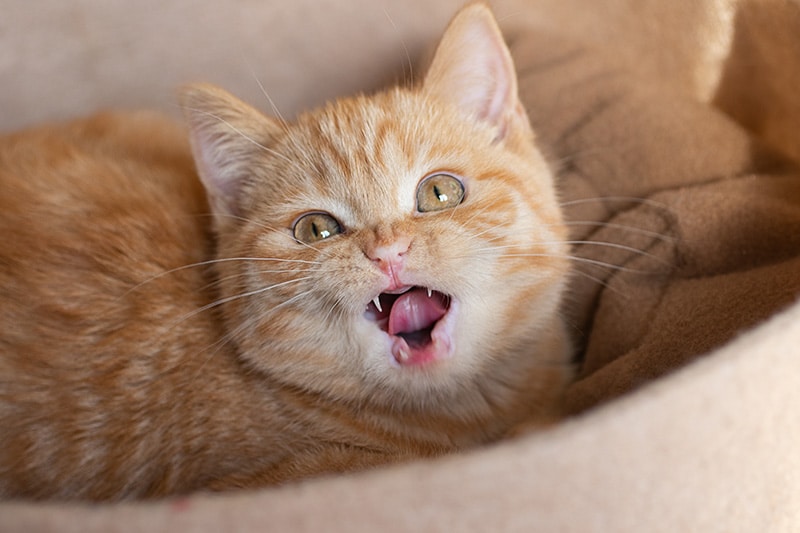
2+ Years
A cat’s personality will change throughout their lifespan. While cats typically calm down by the age of 2, their personalities will continue to develop, just at a slower rate than they did when they were little. Your cat may have sudden personality changes from stressful events, but most personality changes will be slow.
Cats typically become more laidback and calmer as they age. However, this isn’t true for all cats. Health issues can cause stress and make cats more anxious and frightened. Any sudden personality changes should be brought to the attention of your vet.
Will Kittens Have the Same Personality as Their Mom?
It’s easy to believe that mother cats have a huge influence on their kittens, as they spend a great deal of time together. However, the reality is more nuanced. Kittens will often share a few personality traits with their mother, but they won’t be complete copies.
Kittens only get half of their genetics from their mother. The other half comes from the father cat, which may have a completely different personality. Personality traits also tend to develop in a bit of a haphazard way, in many unexpected combinations.
How your kitten spends their beginning weeks also matters. Kittens will spend their first few weeks mimicking their mother’s behavior, which provides essential early socialization. However, your kitten should also be exposed to many other animals, humans, and environments. How you treat your kitten is also critical.
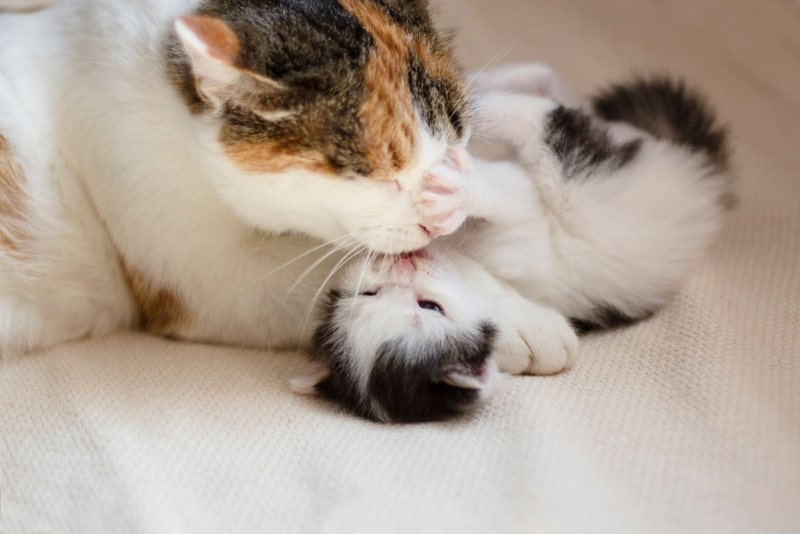
This factor is one reason that it’s so important to adopt from a quality breeder. If a breeder spends time socializing their kittens correctly, they will be much more adjusted to life later. Kittens that aren’t handled much after birth tend to be timid, and there isn’t much that you can do about that afterward.
Kittens are also individuals. Just because a kitten’s mother acts a particular way doesn’t mean the kitten will, even if they grow up with the mother and have similar genetics. Every cat has their own quirks and preferences, which will have a huge impact on their personality.
At What Age Do Kittens Show Personality?
All kittens are born with some personality. However, it can be challenging to tell the difference between a trait that is just part of kittenhood and one that is innate in your kitten. Most kittens will start developing their personality around 2 weeks of age, which is about the time they start interacting with the world.
However, their personalities are far from being set in stone at this point. Their energy levels will remain high until around the time they are fully grown, but this doesn’t necessarily mean they are high-strung. Some cats are active as kittens, only to calm down quickly once they reach adulthood.
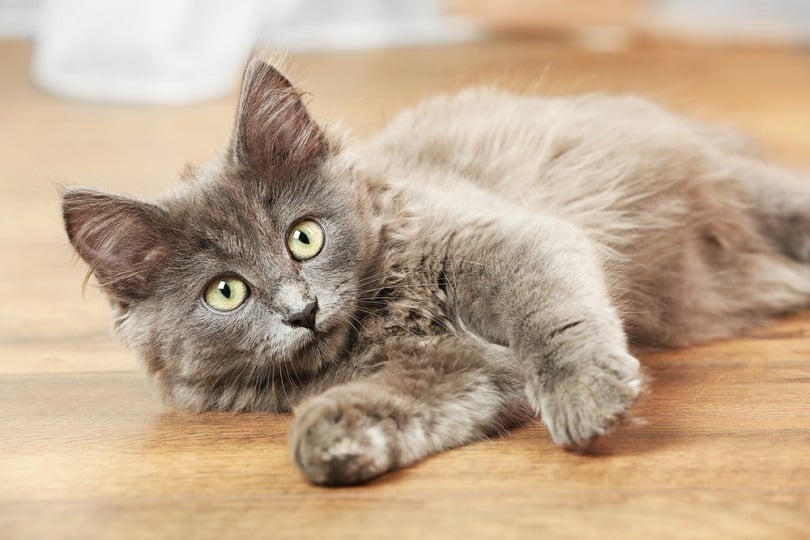
Still, you can expect to see a few differences in kittens starting around 3 months of age and becoming quite apparent by 6 months. Some kittens may be fearless adventurers at this age, while others may be cuddly lap pets. You’ll often see individual preferences for toys and interactions during this time, for instance.
Most kittens don’t settle into adulthood until they’re closer to 1 or 2 years old. Before this point, it can be challenging to determine exactly what a cat will act like. Puberty changes many cats’ personalities, so their younger traits may not stick around into adulthood.

Conclusion
Kittens don’t begin to exhibit much personality until they start interacting with the world. By the time most kittens are ready to go to their forever homes, they will begin showing their personalities somewhat. Since they are young, though, their personalities are likely to change. Puberty and socialization can greatly shape a cat’s personality, altering it significantly from what it was during kittenhood.
Don’t assume that a cat will stay the same as when you first picked them up. While a timid cat is likely to stay timid, the level of timidity can change significantly as the cat ages. Proper socialization can help a timid cat become confident, for instance, and the age of socialization doesn’t end until 12 weeks!
Featured Image Credit: Irina Kozorog, Shutterstock

